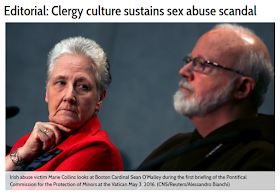https://www.ncronline.org/news/accountability/editorial-clergy-culture-sustains-sex-abuse-scandal:
The resignation of Marie Collins from the Pontifical Commission for the Protection of Minors is a turning point in Pope Francis’ pontificate. It cannot be seen any other way. For all the hope and promise that we find in Francis and his vision for the church, we believe his pontificate teeters on the brink of failure on the issue of sexual abuse by the clergy.
For three and a half years, Francis has promised to take real action to bring accountability to the highest structures of the church and to help heal survivors. Now the commission he created to do that must confront serious questions about its credibility.
For his part, Francis must take some decisive, public action here. He must empower the commission with authority — a fully functioning commission cannot operate without a budget, permanent staff and the power to hire outside expertise. Beyond that, Francis must act to guarantee that the Vatican dicasteries and their personnel cooperate fully with the commission. Those who deliberately frustrate the commission’s work, no matter what level of the Curia they represent, must be replaced with personnel who will claim the eradication of this scandal as part of their mission.
But something deeper is at play here. If all we get are stronger managerial presences and dedicated staff and office space, we may not get the full reform of structures this issue calls out for. A resistance to change that is planted deep within the all-male clerical culture is the largely unaddressed issue at the heart of the scandal and has been since the first major story about it appeared in these pages more than 30 years ago.
The author points out that while sexual abuse is not limited to the Roman Catholic priesthood, but that abuse by priests is “a unique crime” for several reasons:
First, the perpetrators claim, by dint of ordination, an ontological difference from the rest of humanity, a separateness expressed in the belief that they stand “in persona Christi,” specially anointed channels of God’s grace and forgiveness.
Second, the perpetrators belong to a closed and exclusive culture, with its own archaic laws and largely hidden legal proceedings, a culture that enjoyed enormous deference from law enforcement and the courts as well as from ordinary Catholics.
Finally, the culture was long led by men who, it has been shown beyond any dispute, looked first to the preservation of their privileged status and the reputation of their culture before taking into consideration the deep destruction occurring to the most vulnerable in the community.
The suggestion is that “all the straining for some manner of justice” “mean[s] nothing” “if the clergy culture continues to refuse to confront itself and its entrenched and unyielding role in sustaining the sexual abuse scandal”.
The Roman Catholic Church itself – the heart and soul of its system of grace as available only through Roman sacraments, available only through the Roman priesthood, outlined by Gregg Allison in “Roman Catholic Theology and Practice: An Evangelical Assessment”, is at the heart of the problem.
What is necessary to finally put this scandal behind us is a chorus of clerical voices demanding reform of their own culture, demanding that the all-male clerical caste engage in the painful work of understanding what their culture has become, how it could be so deformed that it was able to justify what some have termed the “soul-killing” of the community’s children.
For Pope Bergoglio, who calls himself a son of The Church, it seems as if it is too much to really dive too deeply into his own culture.
It’s an institution that will not change itself.


John: just what can Jorge do with the Vatican bureaucracy; ie what are the limits of his authority over those folks' employment?
ReplyDeleteIf it were important to him, he could move laggard bishops around the same way he's moving Burke around.
Delete